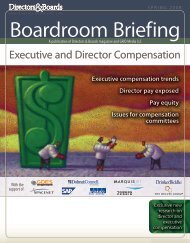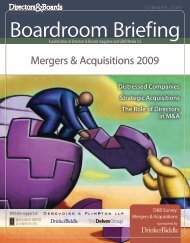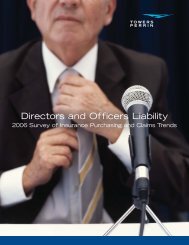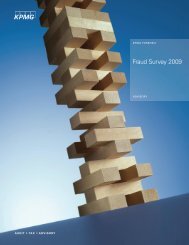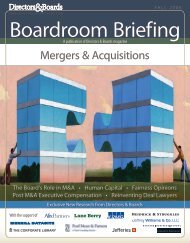The LRN ethics and compliance risk management practices report
The LRN ethics and compliance risk management practices report
The LRN ethics and compliance risk management practices report
You also want an ePaper? Increase the reach of your titles
YUMPU automatically turns print PDFs into web optimized ePapers that Google loves.
Anonymous/Confidential Reporting Chann<br />
Ethics & Compliance Offic<br />
DETAILED RESULTS<br />
Legal Departme<br />
First Reporting Channel<br />
Internal Ombudsm<br />
After supervisors, 1 in 5 companies expects employees to <strong>report</strong> first using the % anonymous/<br />
Respondents<br />
confidential <strong>report</strong>ing channel. This result<br />
0%<br />
may 10% be linked 20% to why companies 30% <strong>report</strong> 40% that their 50%<br />
% Respondents<br />
two top challenges in detection are employee fear of retaliation <strong>and</strong> employees are not<br />
motivated to <strong>report</strong>.<br />
Supervisor 28%<br />
0% 10% 20% 30% 40% 50%<br />
Anonymous Reporting Channel<br />
Supervisor 28%<br />
Given that Ethics anonymous/confidential & Compliance Office 16% helplines are the second most common <strong>report</strong>ing<br />
17%<br />
channel, companies must sure they have qualified personnel to answer the lines <strong>and</strong> refer<br />
Human Resources 13%<br />
16%<br />
allegations to the appropriate function.<br />
Anonymous Reporting Channel<br />
Ethics & Compliance Office<br />
Legal Department<br />
Human Resources 13%<br />
No Set Policy<br />
Legal Department 11%<br />
Internal Ombudsman<br />
No Set Policy 9%<br />
17%<br />
11%<br />
9%<br />
Nearly 1 in 3 companies expects employees to <strong>report</strong> violations first to supervisors.<br />
9%<br />
Given that supervisors Don't are Know expected 4% to be a first line of detection, it is incumbent on<br />
9%<br />
companies to fully educate supervisors so they know how to h<strong>and</strong>le violation <strong>report</strong>s<br />
Don't Know 4%<br />
according to company policies. Again, this is also why involving managers in <strong>risk</strong> assessments<br />
is beneficial for companies, given their greater knowledge of potential gaps <strong>and</strong> high <strong>risk</strong><br />
employees who might cause <strong>ethics</strong> or <strong>compliance</strong> problems.<br />
Internal Ombudsman<br />
First Reporting Channel<br />
No set poli<br />
13. What are your biggest challenges in detecting <strong>ethics</strong> <strong>and</strong> <strong>compliance</strong> violations<br />
Employee fears of retaliation <strong>and</strong> lack of motivation lead the <strong>risk</strong> detection challenges.<br />
Top Challenges<br />
Anonymous/conf<br />
Top Challenges<br />
% Respondents<br />
0% 20% 40% 60% 80% 100%<br />
% Respondents<br />
Employees fear retaliation<br />
0% 20% 64% 40% 60% 80% 100%<br />
Compliance eth<br />
Employees not motivated<br />
Employees fear retaliation 64%<br />
Innapropriate uses<br />
Employees not motivated 54%<br />
Lack of formal <strong>management</strong> process<br />
Innapropriate uses 46%<br />
Employees don't underst<strong>and</strong><br />
Lack of formal <strong>management</strong> process 42%<br />
Insufficient staff to respond<br />
Employees don't underst<strong>and</strong> 33%<br />
Other<br />
Insufficient staff to respond 28%<br />
No significant challenges<br />
Other 19%<br />
54%<br />
46%<br />
42%<br />
33%<br />
28%<br />
19%<br />
13%<br />
No significant challenges<br />
13%<br />
Despite the prevalence of anonymous <strong>report</strong>ing channels, employees fear retaliation <strong>and</strong> lack<br />
the motivation to <strong>report</strong>. Companies cited detection as their main challenge in 2008. Nearly<br />
half of respondents indicate they have no significant problems in this area, while the other<br />
half cites a wide range of challenges that hamper their detection efforts. Topping the list,<br />
almost two-thirds companies believe their employees fear retaliation. Meanwhile, half the<br />
companies cite employee lack of motivation to <strong>report</strong> violations a significant factor.<br />
<strong>The</strong> irony of these statistics about fear of retaliation <strong>and</strong> employee apathy is that<br />
organizations increased their efforts to communicate, educate employees about <strong>ethics</strong> <strong>and</strong><br />
<strong>compliance</strong>, <strong>and</strong> ensure they have ready access to <strong>report</strong> violations. <strong>The</strong> survey results show<br />
that the nearly 9 out of 10 multinational companies offer at least three <strong>report</strong>ing methods<br />
for employees to use in their home region, <strong>and</strong> 7 out of 10 have at least three methods<br />
even in their international offices. Nearly all companies offer their workforce an anonymous<br />
or confidential channel to <strong>report</strong> <strong>ethics</strong> <strong>and</strong> <strong>compliance</strong> violations, <strong>and</strong> in 2 out of 10 of<br />
those enterprises, the company prefers the anonymous line to be its first line of <strong>report</strong>ing.<br />
In addition, 4 out of 10 companies also offer an internal ombudsman as a “go-to” person<br />
<strong>LRN</strong> | 2008 Ethics <strong>and</strong> Compliance Risk Management Practices Report | 33





![[link to PDF] for a copy of the briefing paper - Directors & Boards](https://img.yumpu.com/43729022/1/190x245/link-to-pdf-for-a-copy-of-the-briefing-paper-directors-boards.jpg?quality=85)

